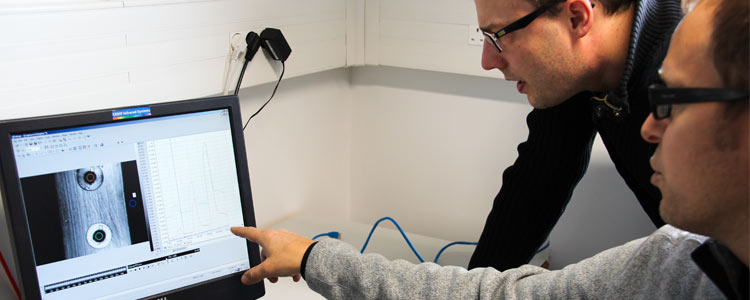(reserved for 4th-year Polytech Annecy-Chambéry students)
Period, duration
May-July 2021, 2 months
Profile required
Mechanical Materials engineering student
Bonus
3.90/h (standard)
Location
Annecy-le-vieux ; Maison de la mécatronique ; Symme laboratory
Subject
The aim of this internship is to develop an innovative experimental manipulation for identifying the elastic limit based on coupled thermal and kinematic observations.
During deformation of a metallic material, the transition from the elastic (endothermic) to the plastic (exothermic) regime results in a drop in temperature (elastic phase) followed by a rise (plastic phase). To study this property, we'll be using 2 of the laboratory's state-of-the-art characterization tools: deformation measurement by correlating images obtained with a digital camera, and temperature measurement with an infrared camera. The development work will involve synchronizing the acquisitions of the visible and infrared cameras with the sensors on the tensile machine that will be used to stress the metallic material.
The challenge will be to determine the experimental conditions for obtaining the cleanest possible thermal signal in the elastic and plastic regimes, in order to accurately identify the transition from one regime to the other. We'll need to test different materials and different types of mechanical stress to find the most favorable conditions for relevant observation.
The link with teaching at the Polytech Annecy-Chambéry engineering school can be seen both in the Materials section (better understanding of the deformation of metallic materials) and in the concrete use of digital methods seen in practical work (post-processing of visible and infrared images).
This internship is a precursor to a funding application for a project that has just been submitted to the French National Research Agency (ANR). The results of the proposed manipulation will be used to support the arguments put forward in the application if it is selected for the second phase.
The candidate must be interested in discovering the world of research, be curious, a driving force, attracted by the development of manipulations and at ease with digital tools.
Contact
Pascale.Balland
@univ-smb.fr
Emile.roux
@univ-smb.fr
Project team
Pascale Balland, teacher-researcher IUT GMP / Symme
Emile Roux, teacher-researcher POLYTECH A-C / Symme
